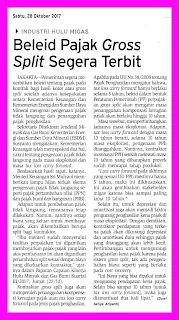The government immediately issues regulation on taxes on gross split share contracts following an agreement between the Ministry of Finance and Ministry of Energy and Mineral Resources regarding the imposition of indirect taxes and deferred income tax.
Secretary of the Directorate General of Oil and Gas of the Ministry of Energy and Mineral Resources (ESDM) Susyanto said the Ministry of Finance has agreed on two things, namely the imposition of indirect taxes on exploitation and tax loss carry forward.
Based on the results of the meeting, Finance Minister Sri Mulyani gave a green light or permit related to indirect tax schemes such as value added tax (VAT) and land and building tax (PBB). As for the imposition of indirect taxes, the plan remains to be done. However, in the future any costs incurred to pay taxes will be returned in the form of split for contractors.
"Finance Minister Sri Mulyani has approved this tax facility to be replaced by paying other taxes on this payment will be replaced with the addition of split in accordance with the cost of the contractor," he said in the Exposure of Upstream Oil and Gas Performance Quarter III / 2017, Friday (27 / 10).
The gross split contractor will also get a deferred tax loss carry forward on the income tax type. If Law Number 38/2008 on Income Tax stipulates that tax loss carry forward is only valid for 5 years, the regulation in the form of Government Regulation (PP) of gross split taxation will set the time of suspension of tax loss compensation will be valid for up to 10 years.
That period, considering the length of the exploration period. Meanwhile, the tax loss carry forward with a period of 10 years means, during 10 years of exploration period, the imposition of Income Tax (PPh) is suspended. Later on, the contractor pays PPh after the 10 year period that the project is expected to reach the production stage.
"Loss carry forward in the end as per the Law of Income should only be 5 years, then this is devoted. This will excite oil and gas stakeholders because it can be up to 10 years at the most. "
In addition, for depreciation and amortization will also be a tax deductible income factor in the exploitation period. Accordingly, the income of the contractor subject to taxes will be reduced depreciation and amortization first so that the tax will be less.
Consideration to reduce taxable income due to the gross split system, no refund as applicable to cost recovery.
"This is a cost that can be used to reduce taxable income. In addition to up to 10 years [for tax loss carry forward, it is also amortized twice as much.
IN INDONESIA
Regulasi Pajak Gross Split Segera Terbit
Pemerintah segera menerbitkan regulasi tentang pajak pada kontrak bagi hasil kotor atau gross split setelah adanya kesepakatan antara Kementerian Keuangan dan Kementetian Energi dan Sumber Daya Mineral mengenai pengenaan pajak tidak langsung dan penangguhan pajak penghasilan.
Sekretaris Direktorat Jenderal Minyak dan Gas Bumi Kementerian Energi dan Sumber Daya Mineral (ESDM) Susyanto mengatakan, Kementerian Keuangan telah menyepakati dua hal, yakni tentang pengenaan pajak tidak langsung pada masa eksploitasi dan masa tax loss carry forward.
Berdasarkan hasil rapat, Menteri Keuangan Sri Mulyani memberikan lampu hijau atau izin terkait skema pengenaan pajak tidak langsung seperti pajak penambahan nilai (PPN) dan pajak bumi dan bangunan (PBB). Adapun untuk pembebanan pajak tidak langsung, rencananya tetap dilakukan. Namun, nantinya setiap biaya yang keluar untuk membayar pajak, akan dikembalikan berupa split bagi kontraktor.
“Menteri Keuangan Sri Mulyani sudah menyetujui fasilitas perpajakan ini digantikan membayarkan pajak-pajak yang lain atas pembayaran ini akan digantikan penambahan split sesuai dengan biaya yang dikeluarkan kontraktor,” ujarnya dalam Paparan Capaian Kinerja Hulu Minyak dan Gas Bumi Kuartal III/2017, Jumat (27/10).
Kontraktor gross split juga akan memperoleh penangguhan kompensasi kerugian pajak atau tax loss carry forward pada jenis pajak penghasilan. Apabila pada Undang-Undang Nomor 38/2008 tentang Pajak Penghasilan mengatur bahwa tax loss carry forward hanya berlaku selama 5 tahun, regulasi dalam bentuk Peraturan Pemerintah (PP) perpajakan gross split akan mengatur waktu penangguhan kompensasi kerugian pajak akan berlaku hingga 10 tahun.
Masa tersebut, mempertimbangkan lamanya masa eksplorasi. Adapun, tax loss carry forward dengan masa 10 tahun berarti, selama 10 tahun masa eksplorasi, pengenaan Pajak Penghasilan (PPh) ditangguhkan. Nantinya, kontraktor membayar PPh setelah melewati masa 10 tahun yang diharapkan proyek sudah mencapai tahap produksi.
“Loss carry forward pada akhirnya yang sesuai Undang-Undang PPh mestinya hanya 5 tahun, maka ini dikhususkan. Ini akan menggembirakan stakeholder migas karena bisa sampai paling lama 10 tahun.”
Selain itu, untuk depresiasi dan amortisasi juga akan menjadi faktor pengurang penghasilan kena pajak di masa eksploitasi. Dengan demikian, pendapatan kontraktor yang terkena pajak akan dikurangi depresiasi dan amortisasi dulu sehingga pajak yang ditanggung akan lebih kecil.
Pertimbangan untuk mengurangi penghasilan kena pajak karena pada sistem gross split, tidak ada pengembalian biaya seperti yang berlaku pada cost recovery.
“lni biaya yang bisa dipakai untuk mengurangi pendapatan kena pajak. Selain bisa sampai 10 tahun [untuk tax loss carry forward, maka juga diamortisasi dua kali lipat.
Bisnis Indonesia, Page-9, Saturday, October 28, 2017


The GOI offers additional tax advantages under GR 53/2017 for (i) the exploration and exploitation phases and (ii) the indirect expenditures of the head office. Before the passage of GR 53/2017, a contractor may have received tax accommodations in the form of exemptions from import duty and import tax. These tax accommodations will continue to be valid until they expire. The MEMR has the authority to specify and offer the kind and quantity of incentives needed to promote the working area's economic growth. Whereas, in accordance with the provisions of the relevant laws and regulations, the Ministry of Finance may offer incentives within the context of using state property.
ReplyDelete